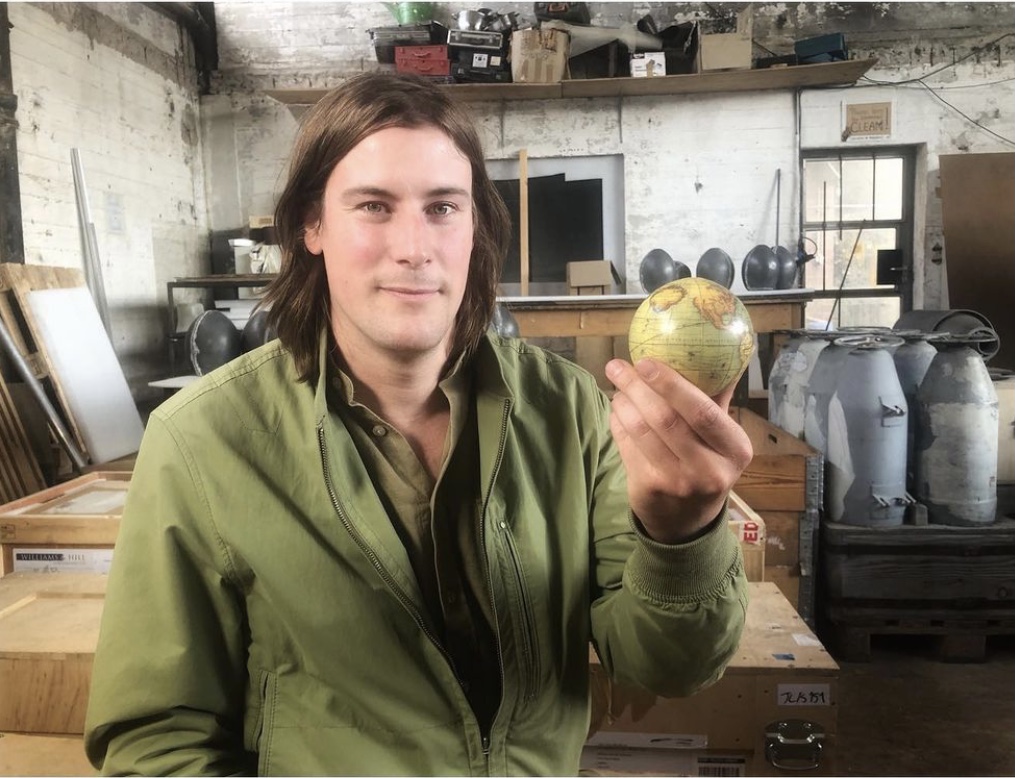The documentary “Reload for the Art World. How Robotics and AI are Changing Creativity,” explores, in the context of new technological developments in artificial intelligence and robotics, how the idea of artist identity drawing from itself might change in the future. Is the concept of genius up for grabs for the first time since the dawn of art history? Written and directed by Frauke Schlieckau. A Lona Media Production.
IN PRODUCTION: REMBRANDT, HABIBI!
In her podcast “Rembrandt, habibi,” which is well worth listening to, political journalist Amina Aziz examines the Dutch Baroque painter and his time with a postcolonial eye. For ZDF Aspekte, we join her on a visit to the exhibition “Rembrandt’s Orient” to look at the art of the public favorite and his contemporaries with irreverence, rather than reverence, for a change. For Rembrandt, artist at the center of a brutally expanding colonial regime, created a strange, fictional image of the Orient with his paintings. How should, how must one deal with it today? A Bottega Berlin Productions for ZDF Aspekte.
ON SCREEN: CLIMATE CHANGE IN THE ARTS, 27.06.2020 19.20, 3Sat
Climate art is booming. Saving the planet is a major theme of biennials and art museums. Climate art á la Olafur Eliasson is a strong image and morally on the right side. But in many cases also “folkloristic kitsch” (Harald Welzer). And sometimes also simply bigoted: because the international art scene with its biennials and fairs is producing a large amount of CO2 itself. What is the role of artists if it comes to dealing with climate change? To shake things up at all costs – just like the artistic forms of action of groups like extinction rebellion? Or to think more modestly and reduce their own CO2 footprint – with less and different art. The documentary explores this question.
Written and directed by Frauke Schlieckau. A production by Kobalt Productions
ON SCREEN: ART & CLIMATE CHANGE, 3SAT KULTURZEIT, 26.06.2020, 19.20
Climate art is booming. Saving the planet is the big theme of biennials and art museums. At the same time, the cultural industry with international events is itself producing lots of Co2. What is the task of art in times of climate change? A contribution by Frauke Schlieckau for 3Sat Kulturzeit.
IN PRODUCTION: ART AND CLIMATE CHANGE, 3SAT KULTURZEIT
Climate art is booming. Saving the planet is the big theme of biennials and art museums. At the same time, the cultural industry with international events is itself producing lots of Co2. What is the task of art in times of climate change? A contribution by Frauke Schlieckau for 3Sat Kulturzeit.
ON SCREEN: MENSCH. HERBERT. 29.05.2020. 21.45, Arte
With more than 20 million albums sold, Herbert Grönemeyer is considered the most successful German musician of all time.
For ARTE, this is an occasion to honor the work of this exceptional talent with the documentary “Mensch.Herbert“, which picks out special highlights from the various decades and areas of his career and fans them out kaleidoscopically. The result is a mixture of film and multiple video installation in a post-industrial look. The film enables the audience to get unusually close to Germany’s model musicians, especially through the close interweaving of archive material and detailed, very personal statements by Grönemeyer. The film can now also be seen in the Arte media library.
Documentation 2016, directed by Hannes Rossacher with the collaboration of Frauke Schlieckau. A production by Kobalt Productions.
IN PRODUCTION: CASPAR DAVID FRIEDRICH – A WANDERER BETWEEN THE WORLDS. Arte, 52 min.
Caspar David Friedrich is a monumental artist, a wanderer between different worlds, between past and present. His works speak of feelings that each of us knows, tell of longing, loneliness, being abandoned. The painter’s paintings are pervaded by a melancholy that serves as his cloak. A cloak in which he wraps the person to make the experience of loneliness and the knowledge of death more bearable. Friedrich found this feeling in himself. The early Romanticist held the opinion that a painter should not paint what he sees before him, but what he sees in himself. A resolution he pursued relentlessly and implemented consistently. This enabled him to capture a universal experience on canvas: The inevitability of knowing that we enter the world alone and leave alone. This is precisely why Caspar David Friedrich’s work is so timeless.
Director: Nicola Graef / Frauke Schlieckau, a Lona Media production
ON SCREEN:JÈRôME BEL – LIGHT-FOODED DANCE WITHOUT CO2 FOOTPRINT, ARTE METROPOLIS 15.03., 16.45 PM
For years the star choreographer Jérôme Bel jetted around the globe. But this is over now. The Frenchman no longer flies: for the sake of the climate. He is rehearsing the US version of his latest piece “Isadora Duncan” with dancer Catherine Gallant via Skype. Despite a six-hour time difference between Paris and New York and a poor online connection.
IN PRODUCTION: METROPOLE HEIDELBERG FOR ARTE METROPOLIS
The Heidelberg Castle is the most popular sightseeing spot in Germany and attracts countless of visitors to the Neckar Valley every year. Thanks to its picturesque ruins and a doll’s house like old town, Heidelberg has become a romantic destination in our minds. A city as a postcard idyll. But what about the cultural scene apart from the well-known clichés? For Arte Metropolis Frauke Schlieckau visits Heidelberg and talks to the German hiphop legend Toni L. from Advanced Chemistry, the publisher Manfred Metzner and the artist Cholud Kassem to find out.
IN PRODUCTION: FEELINGS! FOR ARTE METROPOLIS
Contemporary art has a hard time. “Awesome”, “absurd”, “incomprehensible”, many people think so and leave the discourse to the intellectual upper class. Yet anyone could understand art – if only one more language would establish itself: That of emotions. At least that’s the opinion of Bernhard Schwenk and Nicola Graef, the curators of the exhibition “Feelings” in Munich’s Pinakothek der Moderne. For Arte Metropolis, Frauke Schlieckau traces the role that emotions play in art and meets the artists Ruprecht von Kaufmann and Alexandra Ranner in their studios.









